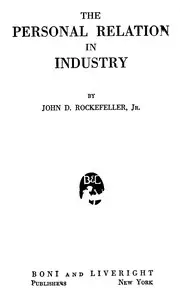"The Principles of Scientific Management" by Frederick Winslow Taylor is a publication that calls for a major shift in how businesses are run. It points out the need for new ways to boost how well work is done in factories, and it wants managers and workers to team up differently. The author thinks that to get more stuff made and make workers happier, companies need plans for handling workers. These new management ideas should dump old, iffy methods. The publication starts by talking about how America needs to make stuff better, pulling in a quote from President Roosevelt. It then shows how many workplaces aren't getting much done, mainly because workers slow down on purpose, which the author calls "soldiering." To fix this, the author says we need "scientific management," which means training workers the right way, paying them fairly for what they do, and mending fences between the boss and the workers. It suggests that the way things should be is when companies and their workers both get a good deal from the work completed everyday. All this prepares for more talks on ways to get many kinds of workplaces to make more through plans that use science.

The Principles of Scientific Management
By Frederick Winslow Taylor
To boost national productivity and harmony in the workplace, this game-changing approach to management encourages cooperation between employers and employees through science-backed plans.
Summary
About the AuthorFrederick Winslow Taylor was an American mechanical engineer. He was widely known for his methods to improve industrial efficiency. He was one of the first management consultants. In 1909, Taylor summed up his efficiency techniques in his book The Principles of Scientific Management which, in 2001, Fellows of the Academy of Management voted the most influential management book of the twentieth century. His pioneering work in applying engineering principles to the work done on the factory floor was instrumental in the creation and development of the branch of engineering that is now known as industrial engineering. Taylor made his name, and was most proud of his work, in scientific management; however, he made his fortune patenting steel-process improvements. As a result, scientific management is sometimes referred to as Taylorism.
Frederick Winslow Taylor was an American mechanical engineer. He was widely known for his methods to improve industrial efficiency. He was one of the first management consultants. In 1909, Taylor summed up his efficiency techniques in his book The Principles of Scientific Management which, in 2001, Fellows of the Academy of Management voted the most influential management book of the twentieth century. His pioneering work in applying engineering principles to the work done on the factory floor was instrumental in the creation and development of the branch of engineering that is now known as industrial engineering. Taylor made his name, and was most proud of his work, in scientific management; however, he made his fortune patenting steel-process improvements. As a result, scientific management is sometimes referred to as Taylorism.














